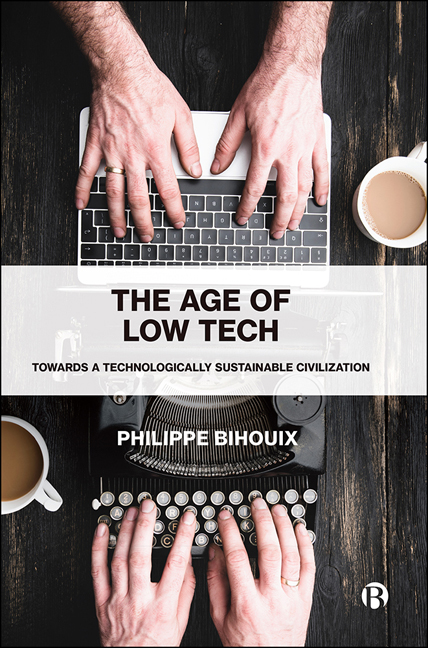Book contents
- Frontmatter
- Contents
- List of Figures and Tables
- Acknowledgements
- Preface to the English Edition
- Prologue: The Mad Dance of the Shrimps
- Part I The Rise and Fall of ‘Engineering Miracle-Workers’
- Part II The Principles of Simple Technologies
- Part III Daily Life in the Era of Simple Technologies
- Part IV Is ‘Transition’ Possible?
- Epilogue: A Dream If Ever There Was One
- Notes
- Index
Prologue: The Mad Dance of the Shrimps
Published online by Cambridge University Press: 19 March 2021
- Frontmatter
- Contents
- List of Figures and Tables
- Acknowledgements
- Preface to the English Edition
- Prologue: The Mad Dance of the Shrimps
- Part I The Rise and Fall of ‘Engineering Miracle-Workers’
- Part II The Principles of Simple Technologies
- Part III Daily Life in the Era of Simple Technologies
- Part IV Is ‘Transition’ Possible?
- Epilogue: A Dream If Ever There Was One
- Notes
- Index
Summary
It is May 1940. German armoured columns have broken through the French lines and the terrified population is pouring onto roads that are quickly becoming clogged by refugees. From his spotter plane, sent on a desperate mission over enemy lines to gather information that nobody will use, Antoine de Saint-Exupéry contemplates the debacle:
Of all these objects the most pitiful were the old motorcars. A horse standing upright in the shafts of a farm cart gives a sensation of solidity. A horse does not call for spare parts. A farm cart can be put into shape with three nails. But all these vestiges of the mechanical age! This assemblage of pistons, valves, magnetos and gear-wheels! How long would it run before it broke down?
Forgive me, my dear Saint-Ex, for using your insightful reflection as an example of low-tech, simple technologies. As an intrepid aviator, you were of course wholly convinced by advanced technologies. But you asked for it, proposing the abandoning of yesterday's elegant cars to return to the horse and cart! Nothing, for me, summarizes better the crucial question facing our industrial society. Exchange electronics for the mechanical – replace pistons and valves by transistors and capacitors – and the insight is as fresh today as it was in 1940. Could our technically complex, globalized, specialized world withstand a catastrophe, whatever it might be – a dearth of easily accessible energy and material reserves, the consequences of pollution – especially climate change – or some new and more acute financial and economic crisis?
This book develops the thesis, radical I know, that instead of seeking topdown solutions to current environmental and societal challenges, instead of seeking ever more innovation, high technology, digitalization, competition, networking, growth – giving them names such as ‘sustainable development’, ‘green growth’, ‘Economy 2.0’ – we must instead direct ourselves, as quickly as possible, to a society based primarily on simpler technologies, undeniably cruder and more basic, maybe a little less powerful, but much more resource-efficient and locally controllable. This idea is not new: as early as the 1940s and 1950s, writers like Bernard Charbonneau and Jacques Ellul denounced the race towards more technological societies; in the 1960s and 1970s, Ivan Illich and Ernst Friedrich Schumacher argued for the use of ‘convivial’ or ‘intermediate’ technologies.
- Type
- Chapter
- Information
- The Age of Low TechTowards a Technologically Sustainable Civilization, pp. xiii - xviiiPublisher: Bristol University PressPrint publication year: 2020



